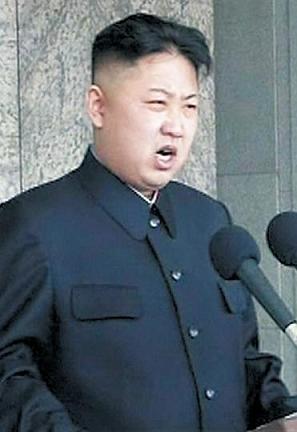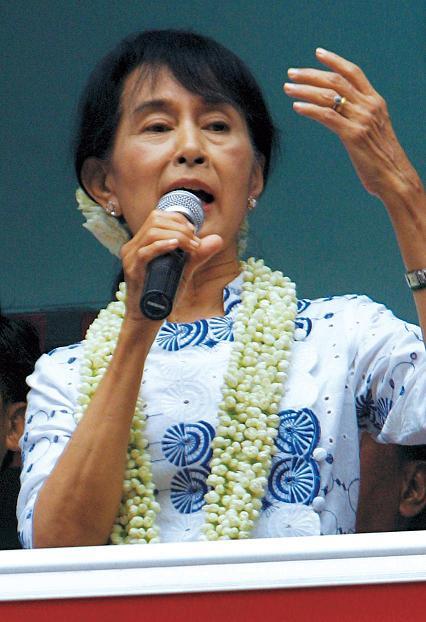Pyongyang remains isolated whereas Myanmar moves toward democracy
Until recently, both North Korea and Myanmar were labeled pariahs by the international community for their autocratic rule, human rights abuses and closed-door policy. But they are now on completely different paths.
Pyongyang remains isolated and sanctioned while sticking to its military adventurism despite criticism for undermining peace and security here and beyond, and failing to take due steps for its crumbling economy and starving people.
But the Southeast Asian state has recently made strides toward democracy, which the U.S., the EU and others have rewarded by relaxing long-standing economic sanctions.
Until recently, both North Korea and Myanmar were labeled pariahs by the international community for their autocratic rule, human rights abuses and closed-door policy. But they are now on completely different paths.
Pyongyang remains isolated and sanctioned while sticking to its military adventurism despite criticism for undermining peace and security here and beyond, and failing to take due steps for its crumbling economy and starving people.
But the Southeast Asian state has recently made strides toward democracy, which the U.S., the EU and others have rewarded by relaxing long-standing economic sanctions.


Its government has freed hundreds of political prisoners, eased media control, reached truces with ethnic rebels and held by-elections that enabled iconic opposition leader Aung San Suu Kyi to enter parliament.
Above all, the critical difference between them is the level of opposition activities. Pyongyang apparently has no such word as “dissent” in its political vocabulary, while there has long been the formidable opposition figure in Myanmar.
“The biggest difference is the existence of reformist figures in political circles,” said Jang Jun-young, senior research fellow at the Center for Southeast Asian Studies at Hankuk University of Foreign Studies.
“On the surface, all reforms and openness policies are led by the Myanmarese government. But in actuality, it closely coordinates with Suu Kyi. That is why the reforms are moving forward without much resistance.”
While Myanmar has the Nobel peace laureate who has strengthened her political capital and international support while under house arrest for much of the last quarter-century, the North has no personality to speak out against its repressive regime.
“In the 1950s, its national founder Kim Il-sung purged all potential opposition forces, which made its society monolithic. But in Myanmar, the opposition heroine Suu Kyi has gained her foothold through electoral procedures,” said Park Eun-hong, a social science professor at Sungkonghoe University.
Jang of HUFS noted that whereas power is monopolized by a single leader in Pyongyang, top military leaders or retirees in Myanmar share administrative power, albeit unequally.
Another critical motivation for Myanmar’s reform was its public’s experience in democratic electoral procedures, which are inconceivable in the North that has recently seen a third power succession.
After Britain’s colonial rule from 1886 to 1948, people in Myanmar enjoyed electoral democracy until 1962 when the military took control of the country through a coup.
“In Myanmar, people had an experience of electoral democracy, which might stem from remnants of British colonial culture, and are now aware that political legitimacy is based on fair electoral procedures,” said Park of Sungkonghoe University.
“The popular uprising in 1988 in Myanmar brought back such memories of democracy and the military junta had also been aware that they were not free from such public sentiment.”
Pyongyang also holds elections to pick members of its rubber-stamp Supreme People’s Assembly. Defectors say voters who were brainwashed to worship the Kim dynasty are forced to pick a single candidate nominated by the ruling Workers’ Party.
Stressing the role of the Association of South East Asian Nations in bringing Myanmar out into the international community, Hong Hyun-ik, senior research fellow at Sejong Institute, said South Korea should do more to encourage Pyongyang to open up.
The 10-member ASEAN has continued economic cooperation with Myanmar despite international sanctions against the country, and used its leverage to persuade it to take the path of reform, he said.
“But in the case of North Korea, its neighbors including Seoul and Tokyo have joined sanctions against it, which shrank room for the North to open up to the outside world,” Hong said. “For Pyongyang to change, it is crucial whether South Korea takes the role ASEAN has played for Myanmar to make a shift.”
Myanmar joined the association in 1997 after it struggled for membership for nearly two decades amid criticism for its dictatorial rule and human rights violations. It failed to take its turn as the rotating chair of the association in 2006 under international pressure. But last year, Myanmar was chosen to chair the organization in 2014.
Although skeptics say reforms taking place in Myanmar may be fragile, they can be sustained with efforts to diversify its diplomatic policy, which had focused heavily on China, analysts said.
For both Myanmar and the North, China has been the primary patron. Analysts said that for the Asian power, Pyongyang has been a buffer against American power while Myanmar, with untapped rich resources including oil and natural gas, is of a great strategic value.
In recent months, however, there has been talk of the North being a liability for China’s future as it continues to make provocative moves, such as the recent botched rocket launch, that damage Beijing’s national interests.
But Myanmar still remains a crucial strategic spot for China, which experts say is part of the reason why Beijing has supported Myanmar when the West tightened its sanctions for the country’s poor human rights conditions.
China has pushed for a project to build several pipelines through Myanmar to transport oil and natural gas. The pipelines will reduce the cost for transporting its oil imports from the Middle East or Africa by replacing routes through the Strait of Malacca. For China, Myanmar is also crucial to advance into the Indian Ocean.
Aware of such China-centered schemes, Myanmar has begun to seek a more balanced relationship with it and diversified its foreign policy.
“Myanmar does not want to be too dependent on China as it has been for the last two decades. What it really wants is to maintain a balanced position between big powers such as China, the U.S. and India,” said Jang of HUFS.
A wave of ongoing changes in the communist bloc, including Vietnam, could serve as a lesson for Pyongyang, but in the country where outside information is tightly controlled with no social networking services, reform is still fanciful, experts said.
By Song Sang-ho (sshluck@heraldcorp.com)
-
Articles by Korea Herald








![[KH Explains] Hyundai's full hybrid edge to pay off amid slow transition to pure EVs](http://res.heraldm.com/phpwas/restmb_idxmake.php?idx=644&simg=/content/image/2024/04/18/20240418050645_0.jpg&u=20240419100350)







![[From the Scene] Monks, Buddhists hail return of remains of Buddhas](http://res.heraldm.com/phpwas/restmb_idxmake.php?idx=652&simg=/content/image/2024/04/19/20240419050617_0.jpg&u=20240419175937)

![[KH Explains] Hyundai's full hybrid edge to pay off amid slow transition to pure EVs](http://res.heraldm.com/phpwas/restmb_idxmake.php?idx=652&simg=/content/image/2024/04/18/20240418050645_0.jpg&u=20240419100350)

![[Today’s K-pop] Illit drops debut single remix](http://res.heraldm.com/phpwas/restmb_idxmake.php?idx=642&simg=/content/image/2024/04/19/20240419050612_0.jpg&u=)